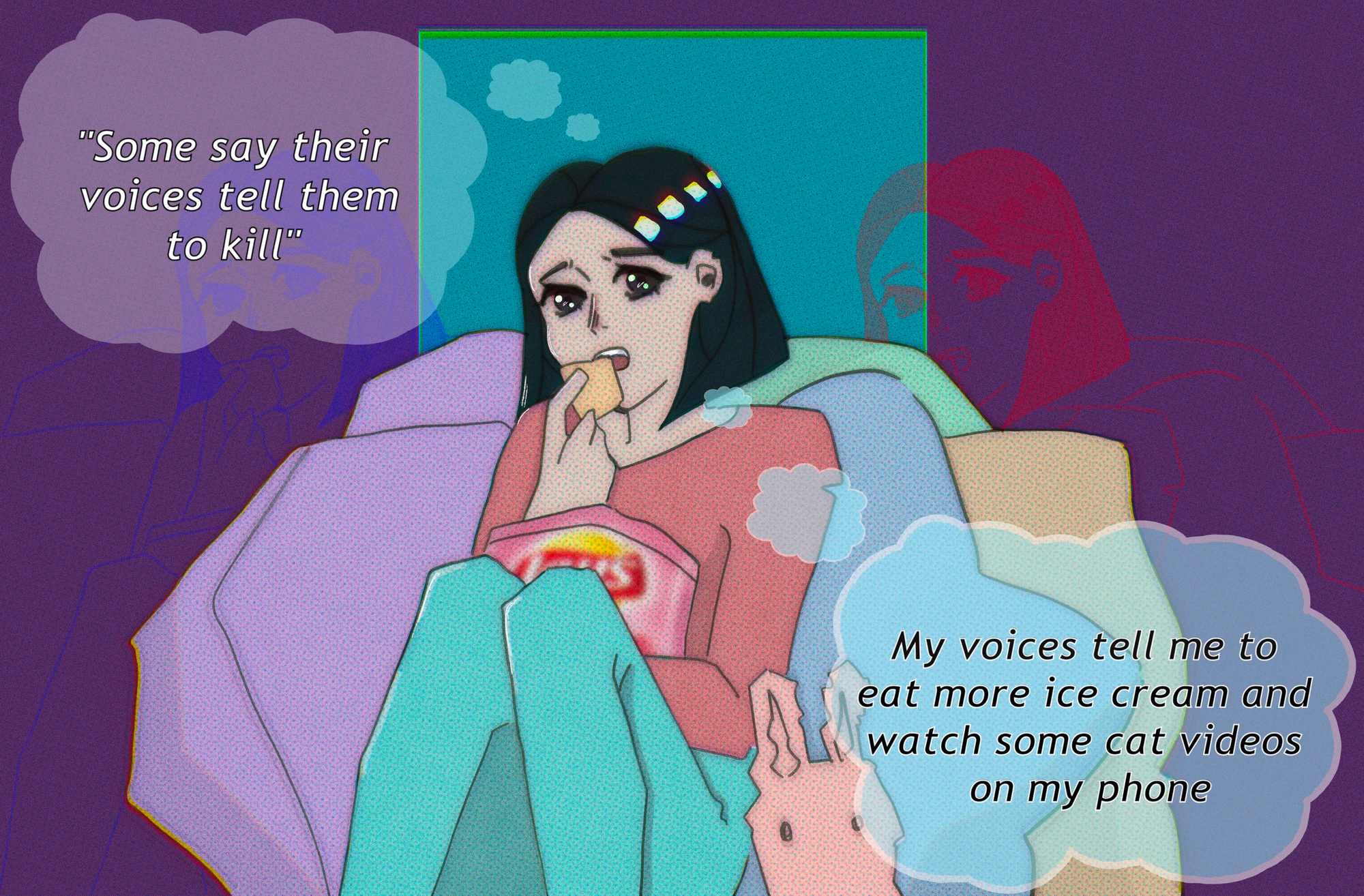What If You Hear Voices?
In movies, hearing voices goes hand in hand with killing people. Popular culture greedily perpetuates the image of an aggressive psycho. As a result, I suspect it is a common belief that people who hear voices are dangerous.

Even though most of us have some idea of what schizophrenia is, there are still a lot of blank spots:
- People believe that if two parents have schizophrenia, their children nearly certainly will develop schizophrenia. Meanwhile, in reality, it is still a 50/50 chance, and even if an identical twin is diagnosed with the condition, the risk is 65%, nowhere near a certainty (Healthline.com).
- People believe that schizophrenia exists in the same form in every culture. Meanwhile, this study demonstrates the opposite.
- People even believe that the industry of psychiatry has unfailing methods of treating people with schizophrenia. Meanwhile, in reality, multiple factors that can make the treatment challenging: from "patient-related factors (e.g., persecutory delusions, lack of insight, health care beliefs)" to "medication-related factors (e.g., lack of efficacy, distressing side effects)" (https://www.psychiatrictimes.com). Ironically, the first group of factors could be seen as a symptom of the condition itself, whereas the latter is just a comment on the quality of the treatments available.
On top of that, popular culture greedily perpetuates the image of an aggressive psycho.
"Aside from ignorance, images of the aggressive, sadistic "schizophrenic" are plentiful in the media. Such stereotypes only further the stigma and quash any shred of sympathy for individuals with this illness, writes Dr. Torrey" (Tartakovsky).
As a result, I suspect it is a common belief that people who hear voices are dangerous.
Where You Here Your Voices Matters
As we see in Morin's article, as well as in the study "Differences in voice-hearing experiences of people with psychosis in the USA, India, and Ghana," people's experiences with voice-hearing vary not only from person to person but also culturally.
It seems that in the individualistic American society, voices are seen as unwelcome intruders, first and foremost. These American voices behave in accordance with the expectations and are often negative, aggressive, and disabling.
People in India and Ghana identify through relationships they have, so they are more prone to treat their voices as guests–as the extended family that came to visit and never left.
They develop relationships with their voices and learn to somewhat understand and utilize them.
Of course, there were exceptions in all three groups, but overall the study presents a fascinating case.
It is also important to note that aggressive voices do not necessarily mean aggressive behavior: as Irene S. Levine, Ph.D., remarks, "People with schizophrenia more often tend to be victims rather than perpetrators of violence" (Tartakovsky). So, even in America, schizophrenia does not necessarily mean danger.
What Would You Do If You Heard Voices?
I used to think of schizophrenia as if it was a death sentence–this view is common and fairly well-grounded in Western reality.
I used to believe that hearing voices would:
- be shameful and troublesome;
- make me hurt people I love;
- erase all of the good I've ever done.
Now, especially after reading chapter two of Blackman's Hearing Voices and familiarizing myself with the disorder of consciousness approach to hallucinations, I would be more curious to start a conversation with my voices if I'm ever to hear them.
I came to realize that it is not so much the voices that disable people, as it is the way society, individuals, and specialists treat those voices that provokes conflict and leads to irreparable damage.
And I grew infinitely more compassionate toward people struggling with their voices. I am not as quick to judge or dismiss them. I feel less scared of them. And I really want to try and help, to challenge the stigma, to improve the lives of those affected. And spreading awareness is crucial if we want to reduce the stigma.
The illustration at the top of this blog post is by Mima.